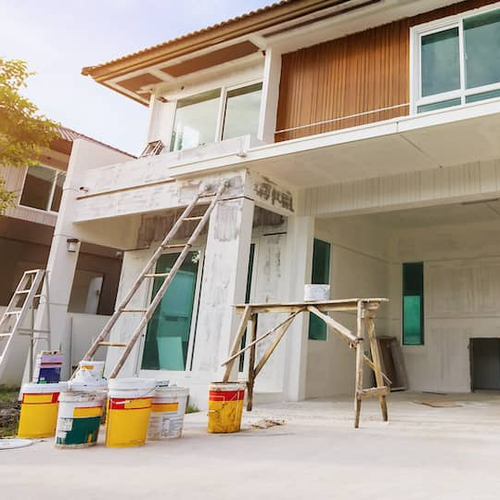What home improvements are tax-deductible? IRS rules and eligible upgrades
Contributed by Tom McLean
Dec 12, 2025
•7-minute read

Home improvements are among the more expensive aspects of owning a home. While home repairs typically don't qualify for tax deductions under IRS rules, home improvements may be eligible for certain tax benefits. Improvements that add value to the home, prolong its useful life, or adapt the property to new uses may save you money on taxes. However, you may not benefit until you sell the home.
Learn more about the IRS rules for deducting the cost of home improvements from your taxable income, and 7 of the most common improvements eligible for IRS home improvement deductions.
IRS requirements for tax-deductible home improvements
A home improvement that adds value to your home or adapts it for a new use can save you money on taxes. However, you're unable to deduct these costs – known as capital improvements – from your taxable income. Instead, you use the cost of these improvements to increase your cost basis in the home, which reduces your capital gains tax liability when you sell your home.
When you sell your home, you pay capital gains taxes based on the profit you earned from the sale. There are ways to reduce or avoid capital gains taxes on real estate. There is an exemption on the first $250,000 of profit made if you're single or married filing separate returns, or $500,000 if you're filing a joint return.
For example, say you buy a home for $150,000 and later sell it for $500,000. You earn a profit of $350,000, of which $250,000 is exempt, and you'd pay capital gains tax on $100,000.
If you make $50,000 in home improvements that qualify for an increase in your cost basis, you can reduce your profit by that amount. In that case, your profit on the home would be $300,000, and you'd have to pay capital gains tax on $50,000 after the exemption is applied.
Under IRS rules, a renovation qualifies as a capital improvement if it is permanent and either adds substantial value to the home or prolongs the useful life of the property. It also can adapt the property to new uses.
Make sure you document what you spend on capital improvements. Keep receipts, bank statements, and other documents to show how much you spent on the renovation so you can claim it when you sell the home.
Home renovations vs. home repairs
Are home repairs tax deductible? The IRS may distinguish between home renovations and home repairs. In general, home repairs are not tax-deductible.
The IRS list of capital improvements is published online. In general, these improvements add value to your home, adapt it for new uses, or prolong its useful life. Repairs restore your home to its previous state. Repairs made as part of a capital improvement may qualify for a deduction.
Some examples of qualifying renovations include:
- Entire room remodels
- Home additions
- Upgrades to systems, such as heating and cooling, security, and ductwork.
- Plumbing upgrades, including the septic system, water heater, and filtration system.
- Upgrades to your home’s exterior, such as a new roof or siding, and adding storm windows.
- Landscaping improvements
- Adding or replacing the insulation
- Interior home improvements, such as adding wall-to-wall carpeting or new floors, or modernizing the kitchen with new built-in appliances.
Eligible home improvements that may qualify for tax deductions
Some home improvement costs can be deducted from your taxable income in the year you pay for them. These are the most common examples of improvements that qualify for immediate deductions.
1. Home office upgrades
If you are self-employed and use a portion of your home regularly and exclusively for business, you may qualify for the home office deduction. You can deduct many of the costs associated with your home office as a business expense, including mortgage interest and insurance, as well as upgrades, regular maintenance, and repairs.
To qualify, you must meet these requirements:
- The home must be the principal place of business.
- The home must have a dedicated space used exclusively and regularly for business.
- You generally must not be an employee of another business that works from home; you must be self-employed, though this rule was suspended for 2018 through 2025
If you rent rather than own, you can deduct a portion of your rent based on the size of your office.
2. Home improvements for medical care
If you need to make home improvements for medical purposes, such as making your home wheelchair-accessible, you can take an immediate deduction.
The IRS defines covered medical expenses as those that “alleviate or prevent a physical or mental disability or illness,” such as insurance premiums and the cost of long-term care. To qualify, improvements must primarily benefit the taxpayer and enhance their quality of life, rather than increase the home's value.
3. Energy-efficient home improvements
Under the Inflation Reduction Act, homeowners can claim a deduction of up to 30% of the cost of qualifying energy-efficient home improvements, including such energy-efficient home improvements as windows, insulation, heat pumps, and energy audits.
Any improvements made after Jan. 1, 2023, can be claimed through 2032. However, improvements made in 2025 or later must come from qualified manufacturers. Improvements made in 2026 or later also require a Product Identification Number.
The Residential Clean Energy Credit, which remains active through 2032, allows you to deduct 30% of the cost of clean energy systems, such as solar panels.
4. Rental property maintenance
You can take tax deductions for rental property if you rent out a portion of your home.
For example, you can write off a portion of your adjusted tax basis each year as depreciation. However, that may mean you pay more in capital gains taxes when you sell the home.
You also can deduct the cost of improvements made to rental properties or the portion of your home that you’re renting out, and deduct maintenance costs as a business expense.
5. Improvements made using a mortgage or home equity loan
If you get a home equity loan or home equity line of credit or a specialized home improvement loan, and use the money to make improvements to your home, you can deduct the cost of the interest you paid on that loan when filing your taxes.1 The same is true if you use a cash-out refinance.
There are some limits to this deduction. For one, you can only deduct mortgage interest on loan balances up to $375,000, or $750,000 if you're married, filing jointly. That limit applies across all of your eligible mortgages. The loan also is only eligible if it is used to “buy, build, or substantially improve” the property securing the loan.
Rocket Mortgage® currently does not offer HELOCs.
6. Disaster-related repairs
If you live in a federally declared disaster area, the IRS may automatically extend your filing deadlines while you recover after a natural disaster. This can be helpful while you try to figure out all of the work you need to do to fix up your home.
While you typically can’t deduct the cost of repairs, you can usually claim a casualty loss deduction if your home was damaged by the disaster. This reduces the market value of your property, minus the cost of insurance or other reimbursements.
You can use repair costs as a measure of how much the value decreased, and therefore how much you can deduct, but the IRS won’t let you deduct the repair costs directly.
7. Historic home restoration
The IRS offers a tax credit for historic home restorations, but limitations do apply.
There is a 20% tax credit available for the cost of qualifying projects, such as the rehabilitation of certified historic structures. Generally, the credit applies only to income-producing properties, such as rentals or commercial properties, and not to owner-occupied homes.
Many states and local governments have their own tax credits, some of which apply to owner-occupied historic homes, so you may qualify for these even if you don’t qualify for a federal credit.
How are different home projects treated for tax purposes?
Here is how the IRS treats home improvements for tax deduction purposes.
| Home improvement | Tax benefit | Timing |
|---|---|---|
| Routine repairs | None | No deduction |
| Capital improvements (personal home) | Basis increase only | When you sell |
| Energy-efficient or clean energy | Tax credit | Year incurred |
| Home office improvements | Deduction, if qualifying | Year incurred |
| Medical necessity modifications | Deduction, if qualifying | Year incurred |
| Rental property repairs | Deduction | Year incurred |
| Rental property improvements | Depreciation | Over the asset's recovery period |
| Interest on renovation financing | Mortgage interest deduction | Year incurred (if itemized) |
How to claim your home improvement tax deduction
How to claim your home improvement tax deduction depends on which deduction you’re claiming.
If you make a capital improvement that increases your adjusted cost basis in the home, you claim the deduction when you sell the property. You'll provide documentation showing the amount paid for the home and the cost of any capital improvements. You can then subtract that from the sales price of the home and report a lower capital gain.
If the improvement qualifies for an immediate deduction you can take in the year you paid the costs, you’ll usually have to itemize your deductions on that year’s tax return. Depending on the type of deduction, you’ll have to fill out and submit different IRS forms and document each cost and how much you paid.
IRS guidance places special emphasis on keeping receipts, records, and forms for audits. Retain any receipts, purchase orders, canceled checks, and any other document that shows the cost of improvements you make.
Keep in mind that tax laws are subject to change, and eligibility is often conditional. Therefore, read the rules carefully and consult a tax professional before claiming a deduction.
The bottom line: You can deduct specific home improvements on your taxes
For the most part, home improvements that add value to your property aren’t tax deductible. Instead, they increase your cost basis in the home so you pay less in capital gains taxes when you sell the property. There are some exceptions, including energy-efficient upgrades, home office, medical modifications, rental property expenses, and financed interest. This topic is complex, and the rules are intricate, so be sure to retain as much documentation as possible and consult a tax professional.
If you’re looking for a tax-deductible way to make improvements to your home, a cash-out refinance can help you pay for improvements and let you deduct the interest you pay on the loan. You can start by applying with Rocket Mortgage today.
1Home Equity Loan product requires full documentation of income and assets, credit score and max loan-to-value (LTV), combined loan-to-value (CLTV), and home equity combined loan-to-value (HCLTV) ratios. Requirements were updated 11/19/25 and are tiered as follows: 680 minimum FICO with a max LTV/CLTV/HCLTV of 80%, 700 minimum FICO with a max LTV/CLTV/HCLTV of 85%, and 740 minimum FICO with a max LTV/CLTV/HCLTV of 90%. Your debt-to-income ratio (DTI) must be 50% or below. Valid for loan amounts between $45,000.00 and $500,000.00 (minimum loan amount for properties located in Michigan is $10,000.00). Product is a second standalone lien and may not be used for piggyback transactions. Product not available on Ameriprise products. Guidelines may vary for self-employed individuals. Some mortgages may be considered “higher priced” based on the APOR spread test. Higher priced loans are not allowed on properties located in New York. Additional restrictions apply. This is not a commitment to lend.
This article is for informational purposes only, and is not a substitute for professional advice from a medical provider, licensed attorney, financial advisor, or tax professional. Consumers should independently verify any service mentioned will meet their needs.
Refinancing may increase finance charges over the life of the loan.

TJ Porter
TJ Porter has ten years of experience as a personal finance writer covering investing, banking, credit, and more.
TJ's interest in personal finance began as he looked for ways to stretch his own dollars through deals or reward points. In all of his writing, TJ aims to provide easy to understand and actionable content that can help readers make financial choices that work for them.
When he's not writing about finance, TJ enjoys games (of the video and board variety), cooking and reading.
Related resources

10-minute read
Home improvement grants to fund your next repair project
Home improvement grants are a type of financial aid for homeowners to make necessary repairs to their home. Check out our guide to find grant resources.
Read more

8-minute read
Capital gains tax on real estate and home sales: A guide
Selling your home? Learn how capital gains tax on real estate works, how much you might owe, and strategies to reduce or avoid taxes when selling your home.
Read more
5-minute read
How to increase your house value
Upgrading parts of your home is a great way to increase its value. Here are 9 tips about how to get started and finance your renovation projects.
Read more